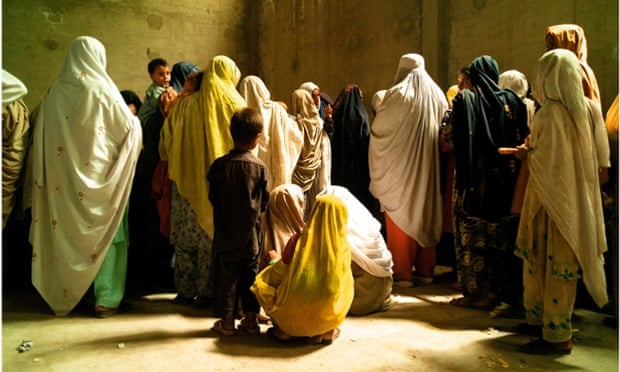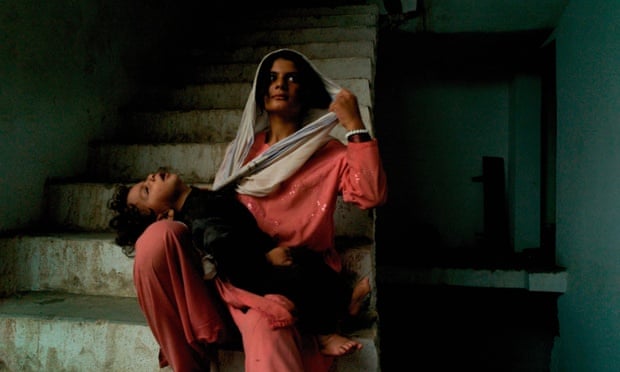Discreet and often in disguise, for five years renowned photojournalist Alixandra Fazzina collected the stories and pictures of women surviving conflict on the borders and in the cities of Pakistan. Now, as fundamentalism spreads across the country she finds herself no longer permitted to move among them but free to tell their stories.
From The Guardian, story by Homa Khaleeli.
‘We nearly died getting this story,” Alixandra Fazzina tells me calmly. The war artist turned award-winning photographer is flicking through the haunting images she took during her five years in Pakistan. Despite covering countries such as Somalia and Yemen – and being held hostage for four days by militiamen in Liberia – Fazzina says Pakistan is the most difficult place she has worked. And it is only now she has left that she can safely reveal many of the stories people told her.
She is lingering over a picture of an 82-year-old woman praying. Sajda, she says, was tortured by the Pakistani army. Her village, close to the Afghan border, was on the frontline of the Taliban insurgency in the Swat valley, and when the fighting engulfed her home, the elderly woman was too frail to escape. “She had two bullet holes in her,” Fazzina says, “but couldn’t leave to see a doctor.” When the 2009 military offensive against the Taliban began, Sajda was arrested by the army, who believed her son had joined the Taliban. Her home was destroyed and she was detained for seven months. “She was tortured,” Fazzina says. “We saw the marks on her back.”
The photographer found her after being tipped off by a network of human rights lawyers and trekking to her remote village, accompanied by a young female translator. Dressed in a burqa and speaking only a little Pashto, Fazzina managed to disguise the fact that she was a foreigner, but the presence of two strangers still attracted attention in the isolated community. “I think it’s only because we were two women that we got away with being there,” she says.
But when night fell, they found themselves surrounded. “It was getting dark when the gunmen came,” Fazzina says. “There were probably about 40 or 50 of them.”
The men watched the pair from the roofs of surrounding houses as they hurriedly left. “We had to walk away from the house with all these guns pointed at our backs,” Fazzina remembers. “We thought we were going to get shot, but we didn’t want to run in case it raised suspicion. My translator was praying the whole way.”

Women wait for rice and oil to be distributed. The queue is for female-headed households – many of them widows – and is thousands of women long Photograph: Alixandra Fazzina
After walking across a valley and crossing a river, they finally reached their car and driver, whom they had left on a narrow mountain road. “A military patrol came past and we thought, ‘Phew, we are safe,’” Fazzina says. “But the next minute, insurgents with guns came out from behind the rocks and tried to stop the car as we sped away.”
It was not her first brush with the Taliban. She points to a picture of two women in abayas, taken outside Al Asif Square in Karachi, a Taliban stronghold. She started photographing Afghan refugees there soon after arriving in Pakistan. “Apparently they had a meeting about me,” Fazzina says as she describes being followed by Kalashnikov-wielding gunmen with kohl-rimmed eyes. “They said, ‘Should we kidnap her? Shall we kill her?’” In the end, she says, “they obviously thought I was harmless”.
It’s a mistake often made about the slight 40-year-old mother of one, and one she has come to rely on for protection. She is drawn to the stories of people caught up in conflicts, often ones that have been largely ignored by the rest of the world. This is why she was interested in Pakistan: the military conflict launched against insurgents there has barely registered with the outside world.
On top of all this is the fear of crime –kidnapping, for instance, is big business in Pakistan. Yet Fazzina counters these dangers not with armoured vehicles or bodyguards, but by remaining under the radar. She tells me (somewhat reluctantly) about a “dressing-up box” of clothes that, along with careful attention to local fashions and body language, help her to blend in. The quiet, personal nature of many of her photographs is testament to the hours she spends building a relationship with her subjects, through conversations and “endless cups of tea”; she followed some families for the whole five years she was in Pakistan. She talks with gratitude and admiration of her translator, Hina, who, with a PhD in human rights law, was as determined as Fazzina to tell the stories of the women they met.

A mother and her seriously ill son shelter in a bazaar after their village was devastated by the floods in 2010. Photograph: Alixandra Fazzina
Her focus was on the women of Pakistan, she says, because they are often the most vulnerable to the upheavals caused by war and conflict. The army’s 2009 offensive in the Swat valley resulted in the world’s largest movement of refugeessince the Rwandan genocide. As almost 3 million people fled, Fazzina heard stories of the mass kidnappings of 200 women. “It transpired this was as brides for Taliban fighters,” she says. “It was very similar to what’s going on in Iraq at the moment.”
Determined to let the world know about the news, Fazzina tracked down some of the families whose girls had been taken, but found no one willing to talk. “I have done stories about the rape of women in Afghanistan, but there it was reasonably easy to talk to the women because they thought it was an atrocity.” In Pakistan, it was much more difficult, she says, because of conservative views about women’s honour. “Once they talk about it, everyone knows and their family will not be able to get them married.”
Eventually, after hearing of the death of a Taliban commander she knew had been involved in the kidnappings, she managed to track down his teenage widow. “She was a lovely, bubbly young girl, just a cool teenager, who had been going to school,” Fazzina says. “She said this marriage had screwed up her life. After the drone strike that killed her husband, she escaped. She wanted to go back to school, but she had a baby. She would never be able to marry again and she was only 16.”
Fazzina believes the psychological trauma of the insurgency has taken a severe toll on Pakistan. “I saw the country fall apart in the time I was there. It’s like the whole country had gone silent. The Taliban have won in a lot of respects.”
Despite this, she says she would have remained in Pakistan if a crackdown against foreign NGOs and journalists had not seen her visa renewal refused. “I fell in love with Pakistan,” she says, simply. “I don’t think I have been anywhere that I have loved working so much. We were met with so much warmth. Despite everything, the people there have so much strength. Now when I watch the news from Pakistan, it breaks my heart that I am not there.”